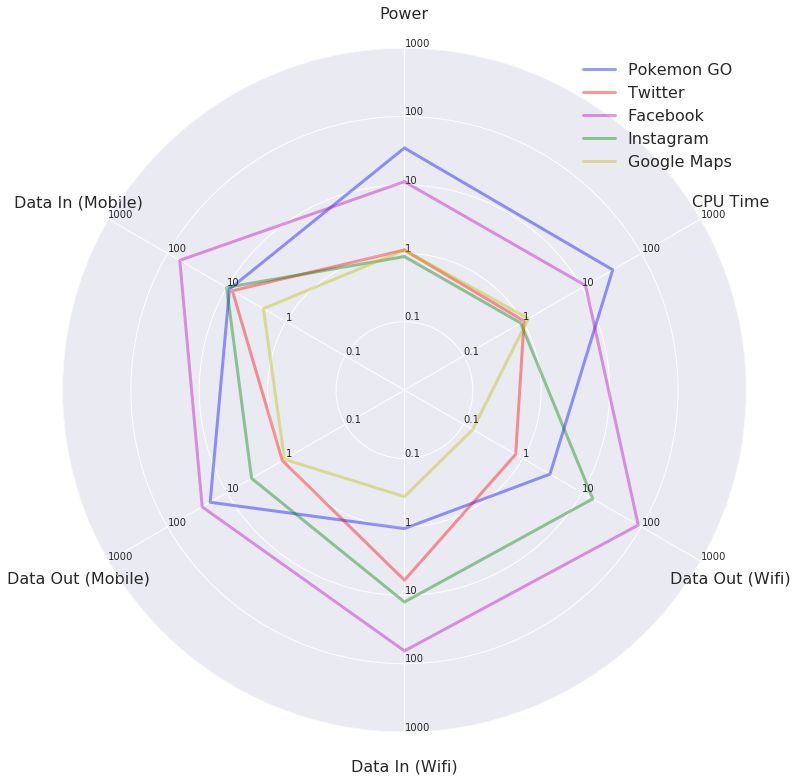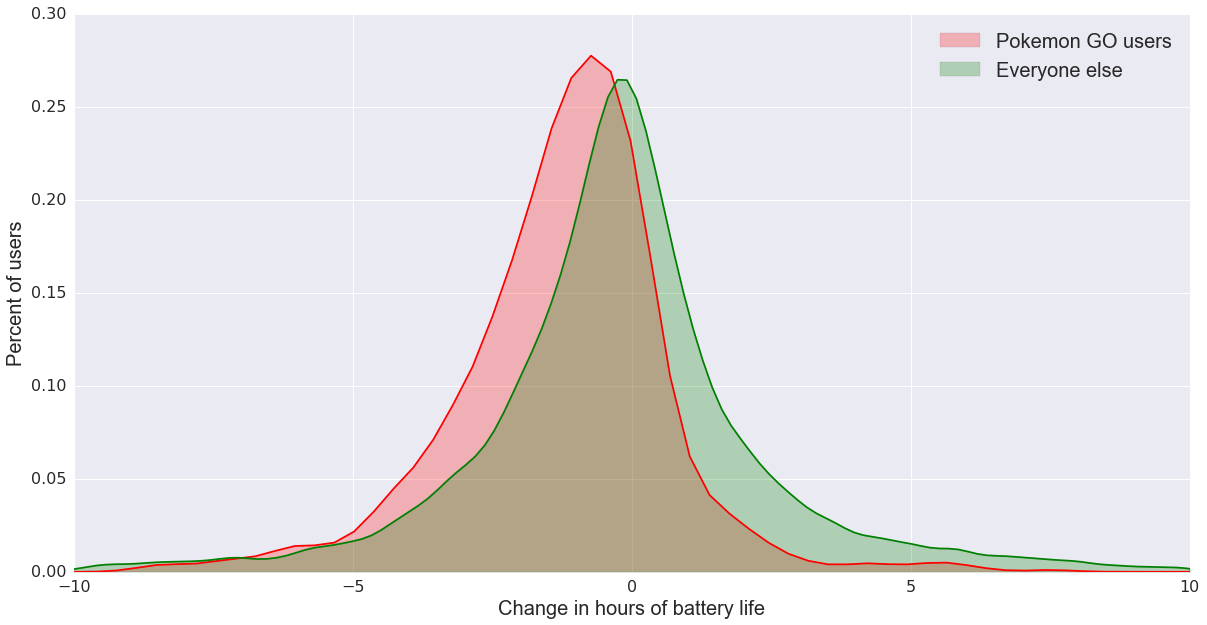In the past 20ish days since Pokémon Go initially launched, there have been two profound truths:
- Everybody is playing Pokémon Go
- Anybody who is not currently playing Pokémon Go is writing about Pokémon Go
As we take a very brief break from the former, we’re taking this opportunity to do the latter. In order to help customers resolve device issues and diagnose problems, we collect diagnostic information about battery and signal usage, as well as general device information. Following in the footsteps of Cardiogram [1] we’ll be looking at some of the data we’ve collected since launch to answer the most important question of this new era:
How much more Pokémon Go can I play today?
Lets dive in.
The Data
To begin with, we started looking at app usage records from ~1600 devices, the full complement that had the app installed and were actively using it at the time of analysis.
At our disposal, we had information about:
- Power Usage
- Mobile/ Wi-Fi data usage
- CPU Time
Going into this experiment, our hypothesis (based on rigorous testing in the field) was that Pokémon Go would have the largest negative impact on battery life. T-Mobile got a lot of press by offering its customers a year of zero rated Pokémon data[2], but compared to things like streaming music and video, it seemed like some metadata about the surrounding gyms, PokéStops, and of course, the Pokémon themselves shouldn’t be devouring your monthly allotment too greedily. CPU time is not particularly useful as a point of comparison since Pokémon Go requires being in the foreground to function, but it’s helpful to consider when comparing the other factors.
To compare, we looked at some of the most heavily used applications on an average user’s phone, from a set of 10,000 devices. These applications were Facebook, Instagram, Google Maps, and Twitter, all of the necessities for a relatively connected life in the 21st century. By averaging the above usages across all measured applications on all analyzed devices we established a baseline by which resource intensive applications could be identified.
Pokémon Go Will Drain Your Battery

The above graph charts the various apps along the metrics collected above, and offers some interesting insights. The most important thing to note is that the scale of the graph is logarithmic, so each concentric circle going outwards represents a significant increase, with the “1” circle representing the aforementioned baseline.
Of course the most immediate observation is that Pokémon Go, does in fact drain your battery, with a power and CPU consumption rate of 30x the average. The next closest app is Facebook, which for most users will be running at all times (whether they know it or not), but given that the average Pokémon Go user will only have the app open for at most a few hours a day, the draining effect is significant.
Google Maps was included out of curiosity for whether the main detrimental battery effect seen was just from GPS activity, but it would seem that it isn’t necessarily the case. We don’t have insight into what the usage pattern of either app is beyond when it is running & accessing the GPS, but our suspicion is that most Google Maps navigation is largely local, where it can pull from Wi-Fi location information, while it would be more GPS intensive on long trips. By this theory, Pokémon Go is leveraging the most battery taxing location modes on both platforms.
Pokémon Go Will Use a Decent Amount of Your Data
Continuing around the circle, we get a look at what the data usage of the app is in both directions. Wi-Fi usage of the app is fairly low, as to be expected since most game time is spent out in the world, but the mobile data usage is surprisingly high. There has been some interesting work done towards decompiling and analyzing the app [3] to see exactly what it’s doing along the network, but aside from the standard analytics/ crash reporting and game metadata there does not seem to be anything that would account for this much usage.
It’s possible that with the server issues Niantic was having around launch network requests are frequently being held open for long periods of time. The frequent communication with the server needed to resolve the optimistic modeling could also be contributing, as each capture, object collection, PokéStop visit will need to be communicated to the server, but that’s all speculation.
Facebook is an expectedly high user of mobile in-bound data, since vacation photos and top down recipe videos need to come from somewhere, but Pokémon is a close second on outbound, and tied with Instagram and Twitter for data coming in. Maybe that T-Mobile deal isn’t too bad after all.
So, how much more Pokémon can you play?
Well, take whatever battery life you got a month ago and subtract 1h 20m and you’ll have a good idea.
We’re still looking into the best way to normalize this based on the amount of game activity, but on the whole we found that a user with Pokémon Go installed will get ~80 min less battery life out of their device (with a p value of 0.000985 if you’re into that sort of thing).

Conclusion
As far as global pop culture phenomena go, few are probably having a more detrimental effect on your smartphone’s battery than Pokémon Go. Both the scale of the application’s user base and the engagement those users have with the app (at least for the moment) are unprecedented, and have been better discussed in many other venues– but we’re glad to have put a number to the reason we’ve all started charging our phones in the afternoon. We’ve also noticed an uptick in high battery alerts issued for our users’ devices, so it’s good to have established a correlation.
We’ll be checking in on the data collected over time to see if any more interesting trends pop up so be sure to check back over time, but until then go stampede in Central Park or something [4].
[1] https://blog.cardiogr.am/is-pok%C3%A9mon-go-making-us-exercise-more-what-apple-watch-heart-rate-data-says-b25bc95c6e97#.h2kq5rmua
[2] https://newsroom.t-mobile.com/news-and-blogs/free-pokemon.htm
[3] https://applidium.com/en/news/unbundling_pokemon_go/
[4] https://www.youtube.com/watch?v=MLdWbwQJWI0